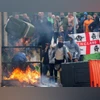Thousands of police personnel, including those with specialist training, are geared up as the so-called standing army of defence against an expected surge of far-right anti-immigration protests on Wednesday, this time targeted at immigration lawyers and their offices.
After a week of violent clashes on the streets of different cities across the UK, British Prime Minister Keir Starmer chaired his second emergency COBRA meeting on Tuesday evening with ministers, police chiefs and security experts to draft a detailed strategy to counter any further riots. A list of solicitors' firms and immigration advice agencies has been circulating online, inviting protesters to "mask up" and turn out described by the government as unacceptable.
We're doing everything we can to ensure that where a police response is needed, it's in place, where support is needed for particular places, that is in place, Starmer told reporters after the Cabinet Office Briefing Room A (COBRA) meeting.
Obviously it's a difficult situation with disorder going on in a number of different places at the same time, but that is precisely why I held my second COBRA meeting to coordinate the response and to get the assurance that I want and need that we do have adequate police in place, that we are able to cope with this disorder, he said.
Around 400 arrests have been made, with around 100 charged and appearing before the courts for a sped up substantive sentencing process.
"That should send a very powerful message to anybody involved, either directly or online, that you are likely to be dealt with within a week. Nobody, but nobody, should be involved themselves in this disorder," added Starmer, who pledged that all communities will be safe.
More From This Section
Stephen Parkinson, England's director of public prosecutions, has warned rioters that they could face terrorism charges.
"We are willing to look at terrorism offences. I'm aware of at least one instance where that is happening," he told the BBC.
In addition to more riot police being on standby, forces are also stepping up neighbourhood policing patrols, teams of detectives are drawing on CCTV, officers' body-worn footage and making use of retrospective facial recognition to identify perpetrators of violence, and intelligence teams are monitoring known influencers and organisers for activity.
This country is faced with one of the worst spates of violent disorder in the last decade. This is a national critical incident and we will do everything in our power to protect London and its communities, said Metropolitan Police Deputy Assistant Commissioner Andy Valentine.
We will not tolerate this on our streets. We will use every power, tactic and tool available to prevent further scenes of disorder. We arrested more than 100 people in central London disorder last week and we will not hesitate to arrest hundreds more if they take to the streets intent on fuelling violence. Our message to anyone who plans to breed disorder is clear you will face the full force of the law, he said.
Liverpool and Durham witnessed some tense face-offs on Tuesday, which was largely free of the scale of violent clashes seen in the preceding days in the wake of the fatal stabbings of three young girls in the seaside town of Southport. Social media misinformation around the UK-born suspect being an asylum seeker has been identified as a major trigger behind the riots.
)